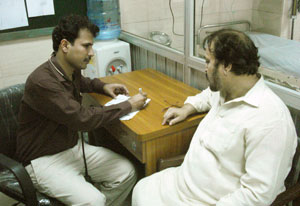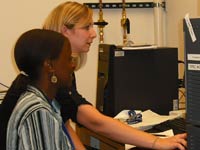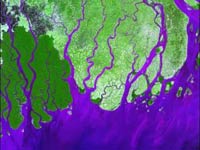Recovery Act projects produce results
October 2010 | Volume 9, Issue 5
In the first year of Recovery Act funding, Fogarty awarded $13 million to 65 different programs and projects. Many of them have already produced results. Here are a few highlights:
Encouraging young scientists
Dr. Regina LaRocque, whose cholera research findings were recently published in the Journal of Bacteriology received a Fogarty International Research Scientist Development Award made possible by Recovery Act funding. LaRocque and her colleagues examined the behavior of laboratory-grown Vibrio cholera, the bacterial agent that causes cholera. Their findings advance knowledge of the general behavior of biological systems and may lead to an effective vaccine and the reduction of bacterial resistance.
Recovery Act funding provided $3 million to expand the Fogarty International Clinical Research Scholars and Fellows Program, which encourages careers in global health by supporting Americans’ international clinical research work. In 2009, the program accepted 21 additional participants and held its first-ever alumni gathering as a forum to share scientific discoveries and experiences.

Photo courtesy of Dr. Rader
A Recovery Act grant is supporting University of
Pennsylvania researchers to coordinate one of
the first surveys of diabetes and heart disease
risk factors in Pakistan.
Information technology gets a boost
A distance learning certificate course was supported to provide instruction in clinical research operations and management, in addition to the ethical and cultural issues involved. Dr. Lynda Wilson,of the University of Alabama at Birmingham, and her team developed a certificate course for 150 study coordinators working outside the United States.
Course materials will be modified and translated into Spanish, and offered through the Cayetano University School of Nursing in Peru. Additional funding will provide training in Zambia.
Health information technology is now a part of each trainee’s work in the AIDS International Training and Research Program in Zimbabwe thanks to Recovery Act support. Dr. Gene Morse and his team, from the New York State University at Buffalo, have developed and implemented an HIV medication management research system that addresses drug interactions, herbal medicines, drug monitoring and pharmacogenomics, a priority as new medications are being introduced.

Photo by Dr. Morse
A Recovery Act grant supported
New York State University at Buffalo's
efforts to train foreign scientists on
the bioanalytical techniques used
with health information technology
applications.

Photo courtesy of Dr. Haygood
Recovery Act funding supported
distance learning activities led by
Oregon Health and Science University
to support its natural products
research efforts in the Philippines.

Image courtesy of Tufts University
An interdisciplinary group of
scientists from Tufts University is
helping Bangladeshi authorities
forecast cholera outbreaks, with
support from the Recovery Act.
Recovery Act funds are also supporting IT and training for a collaboration between the University of Washington and the Department of Health in Da Nang, Vietnam. Dr. Annette Fitzpatrick and her team established one of first stroke registries in Vietnam as well as a community-based risk factor study. Both are vital to understanding stroke and identifying interventions in this low-income setting.
Natural product research may produce cures
Natural products have been a primary source for pharmaceutical agents but have fallen out of favor because of the inefficient discovery process. A Recovery Act supplement extended the employment of IT professionals for this type of research under Dr. Margo Haygood, of the Oregon Health and Science University, who says that specific information and communication technology applications speed her research on the bacteria isolated from Philippine mollusks that researchers hope to use in drugs to treat central nervous disorders and cancer.
Dr. Mark Hay, of the Georgia Institute of Technology, and his collaborators at the Scripps Institution of Oceanography are also improving the process of natural product discovery by capitalizing on advances in DNA sequencing technologies. They analyze marine microorganisms cultured from samples collected around the islands of Fiji. Recovery Act funds contributed to generating a beta version of a database to facilitate this work.
Modeling infectious diseases
Onchocerciasis, or River Blindness, represents the second most significant cause of infectious blindness worldwide. Recovery Act funding helped Dr. Thomas Unnasch, of the University of South Florida, and his colleagues create ecological models using satellite information, epidemiological data and new diagnostic tools to predict where the disease-carrying flies will breed and emerge.
Meanwhile, an interdisciplinary research group led by Dr. Shafiqul Islam of Tufts University is working to give public health officials in Bangladesh the ability to forecast cholera outbreaks two to three months in advance so that people can be treated before they get sick. The work, supported by Recovery Act funds, suggests that drought followed by monsoon rainfall propagates cholera transmission.
Addressing the chronic disease epidemic
Finally, Dr. Dan Rader, of the University of Pennsylvania, is using Recovery Act funds to survey the population and analyze metabolic markers for type 2 diabetes, a major contributor to coronary heart disease. The type 2 diabetes global epidemic is especially pronounced in South Asia where there had never before been a study of clinical epidemiological, biochemical and genetic factors linking the two diseases.
More Information
To view Adobe PDF files,
download current, free accessible plug-ins from Adobe's website.